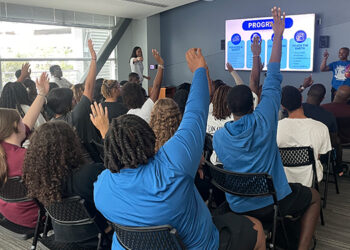There’s a difference between student staff members and professional staff members in any workplace. At campus recreation centers, Peewee Roberson, the managing director of campus recreation at Texas Tech University, recognized these differences are more than pay, benefits and security, but also in taking ownership of the position.
In order to have students take pride in their position at campus recreation facilities, Roberson said directors must connect with the students, “especially now with the millennials and everything else coming up. It’s just a different way of thinking,” Roberson said.
Steve Young, the director of recreation at Temple University, said those connections are even more important today than ever before, because students are the connection to fitness trends and their likes and dislikes about activity at the recreation center.
Student staff members can be the connection into the inner-thoughts of users at your recreation facility. In order to get the most use from student staff members, take a look at these five tips for working with student staff members, from various campus recreation directors. Have a tip of your own? Start the conversation by Tweeting us @CampusRecMag.
Temple University – Steve Young, Director of Campus Recreation
At Temple University in Philadelphia, Pennsylvania, Young employs 200 – 250 students, each year. In the early 90s, Young explained the campus rec center underwent “scrutiny” with their budgeting. During that time, he found his full-time staff was devoting at least 25 percent of their time training student staff, which was not in the job description. To remedy the problem, he hired an associate director for training and assessment.
“Obviously, a heavy part of it is training. But she has a syllabus, like you would be teaching a class,” Young said. “That covers everything from emergency procedures to university policies that they need to know. Once they’re through that big, general training with our associate director, then the coordinators can work with the student staff for site-specific training.”
Texas Tech University – PeeWee Roberson, Managing Director of Campus Recreation
Roberson is not the kind of director that wants his student staff members to only view him as the director of campus recreation. Instead, he wants to make a connection with them. This method is twofold. By making a connection, Roberson believes students will take ownership of their position, and he and his full-time staff can gain insight into fitness trends.
“Staying in contact with them, I think, is the biggest challenge I have. Especially now with the millennials and everything else coming up, it’s just a different way of thinking. For some of us older directors, we need to change with the times as well,” Roberson said.
University of Mississippi – Peter Tulchinsky, Director of Campus Recreation
At the University of Mississippi, Tulchinsky believes making sure students realize they are a part of a bigger campus recreation picture best prepares them for the workforce, post-college.
“We design each of our team development activities to develop skills such as communication, trust, leadership, and preparation, which are critical for team success. Our emphasis on team building helps our students realize that they aren’t just lifeguards or intramural officials, they are part of TEAM CR. Their work is reflective of our entire organization,” Tulchinsky said.
Indiana University – Kathy Bayless, Assistant Dean and Executive Director of Campus Recreational Sports
The Indiana University Campus Recreation staff organize their training around four P’s: Presence, Proactive Engagement, Positive Education and Problem-Solving. Bayless says they are specific, not general, with these goals, and the bar is set high so student employees can be a part of the culture.
“Focus on (a) ‘good show’ over ‘bad show.’ It’s more important and effective to teach and reinforce the behaviors you want (students) to apply and model over the ones you don’t. Most people can picture and explain what’s bad than they can what’s good, needed and expected,” Bayless said.
University of Massachusetts – John Blihar, Director of Campus Recreation
“What we do here at U-Mass, and what I always talk about, is that I believe there is a quid pro quo,” Blihar said. By that, while students are attentive and proactive at their jobs, they should expect the campus recreation center to train them to be able to do their jobs effectively and with skills they will carry into their professional lives, including resume and cover letter reviews and mock interviews.
While Blihar takes training seriously at the University of Massachusetts, he explained that they are still campus recreation, so they should have fun. One weekend each year, they host Campus Recreation Olympic Games, where students employees and professional staff team up to play a variety of games. “All in good fun and to be able to get together and realize that we are all as a team,” Blihar said.
Additionally, four years ago, they formed a Campus Recreation Student Advisory Committee, which meet and have the opportunity to ask Blihar questions or discuss concerns.
“Working for us is like a paid internship, because of the experience they will get and the interaction they will get with people,” Blihar said. “And they’re going to develop transferable skills that they will be able to use no matter whether they’re going into.”










